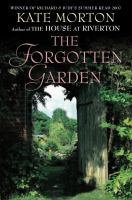The Forgotten Garden is a charming pseudo-gothic novel, transparently drawn from Frances Hodgson Burnett's The Secret Garden. (Mrs. Burnett even shows up as a character in the flashbacks of Kate Morton's book, with the context implying that the idea for her classic story was born during her time at Blackhurst Manor.)
The story spans several generations and alternates between four or more time periods. It can get a bit confusing sorting them out; I resorted to drawing genealogical charts about a third of the way through the book to keep them all straight. I'll try to keep it fairly simple here.
We first meet Nell as a young girl abandoned on a dock in Australia in 1913. The dockmaster and his wife take her in when no one comes forward to claim her. At her 21st birthday party, the man she believes is her father tells her what little he knows of her true origins and it shatters her world. She withdraws from the only family she has ever known and starts searching for more information about her birth family.
Years later, Nell's daughter Lesley arrives with her own daughter, Cassandra, in tow. Leaving Cassandra in her grandmother's care, "just for a week or two," Lesley traipses off with her latest beau. Lesley never returns to reclaim Cassandra and Nell ends up raising her, abandoning her quest to learn more about her past.
Fast-forward again, and Nell has just passed away, bequeathing everything she owns to Cassandra, including the small suitcase found with her on the Australian dock. Cassandra begins her own search for her grandmother's roots, travels to England, and discovers family secrets unknown for decades.
Of course, in the midst of all this, there are flashbacks that slowly reveal details of Nell's earliest years, her parents and grandparents, and the tragic sequence of events that led to her isolation.
Several themes thread their way through the various plotlines. For example, many of the characters struggle with living healthy and fulfilling lives when something they desire greatly is denied them. (Trying to stay spoiler free here...it's hard!) Their desperate wish for the unattainable taints their perception of the world and poisons all their relationships. In the modern day, one of Cassandra's new friends in England tells her, "You make a life out of what you have, not what you're missing." If any of the characters had followed that advice, it would have changed the course of the novel.
Another example: an adult Nell tells herself, "There were none immune to poor judgment when their certainties had been pulled from under them." Again and again, characters in the story made questionable decisions, but almost always it was shortly after learning some unexpected and traumatizing piece of information. The Forgotten Garden seemed to urge both caution when making choices in the wake of difficult discoveries, but also patience and compassion for others' poor judgment in light of their recent experiences.
(Oh, and I know they were supposed to be full of deep symbolism and all, but I found the original fairy tales written by Eliza Makepeace scattered throughout the book to be a bit too heavy-handed. It was so glaringly obvious that they were supposed to be meaningful, that it was just annoying. And "The Crone's Eyes" was downright creepy, and not in a good way.)
********************
The Forgotten Garden
by Kate Morton
ISBN: 9781416550556
Buy it from Amazon here: (paperback, hardcover, ebook, audiobook)
Find it at a local independent bookseller.
Look it up on Goodreads.
Check it out at your local library (find the nearest one here).


No comments:
Post a Comment